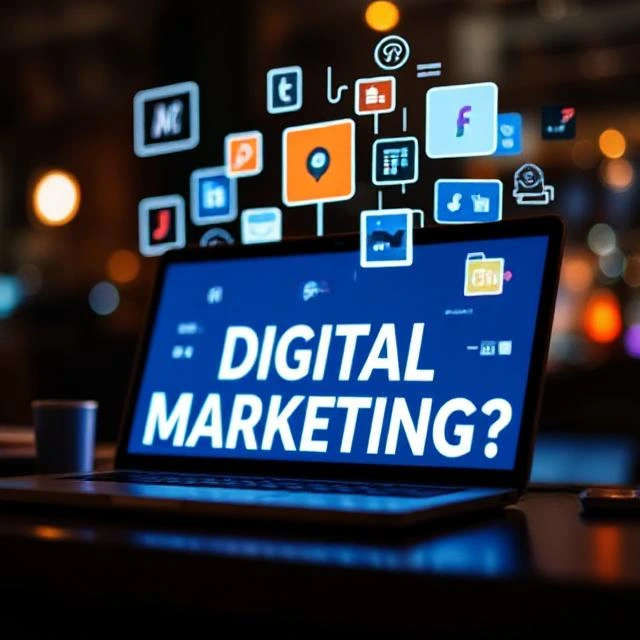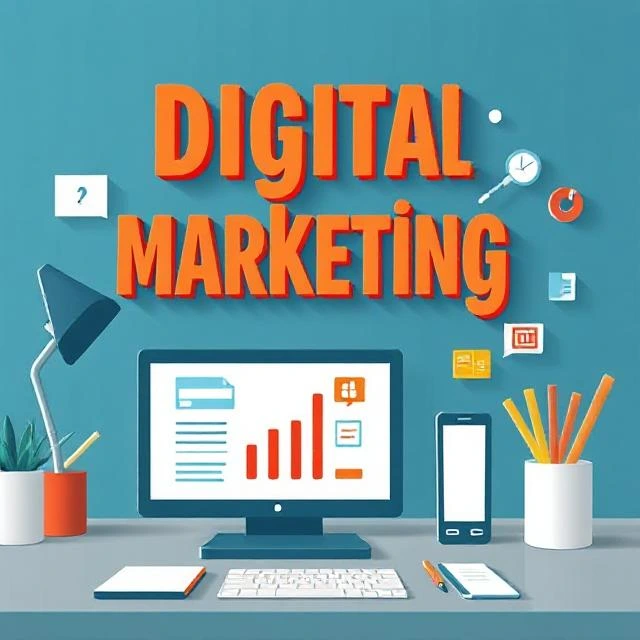
Table of Content
- About
- History
- Importance
- Modules
- Who should use digital marketing?
- Advantages and Disadvantages
- Faqs
- Conclusion
About
Digital marketing refers to the Internet Marketing or Online Marketing. In other words, promoting any kind of business through online i.e. by using search engines, social media, emails, messaging, by creating new websites for your business.
In today’s modern world if we want to increase or promote our business throughout this very big and unique world. We have to use different ways to get better and better day by day. This is the best and easy method to promote any kind of business online. If we have to connect with this big world in prominent and easy way, then we use this.
History
The term digital marketing was first used in the 1990s with the several tech companies allowing this market revolution initially. Companies like Yahoo, founded in 1994 and Google, founded in 1998 plays important role in shaping the digital marketing landscape.
This is a platform that allows any type of business to show advertisement in web pages and in search results, leading to the increase of Search Engine Optimizations [SEO] and Search Engine Marketing [SEM].
As the result of the early 1990s digital rise digital marketing is a tale of technological innovation and entrepreneurial vision. It has transformed the marketing industry from easy online marketing to an advanced field with a wide range of tools and techniques.
- In 1990, the term “digital marketing” was first used. That year, Archie, the first search engine, was introduced.
- The first clickable web commercial banner was introduced in 1993.
- Yahoo was created in 1994 as the first e-commerce transaction on the Net Market.
- 1996 saw the introduction of minor search engines such as Hotbot, Looksmart, and Alexa.
- SixDegree.com, the first social media website, was launched in 1997.
- 1998 was a pivotal year in Google’s history. Microsoft debuted MSN, while Yahoo! introduced Yahoo! Web search.
- This year, the Internet bubble burst, causing SixDegree.com to fail and lesser search engines to vanish.
- Universal Music started the first mobile marketing campaign this year in 2001.
- LinkedIn originated in the year 2002.
- 2003: This year, WordPress was introduced and launched Myspace
- In 2004, Gmail was launched, Google went public, and Facebook went live.
- YouTube debuted in 2005.
- Microsoft introduced MS Live Search in 2006; Twitter was founded this year, while Amazon’s e-commerce sales exceeded $10 billion.
- Tumblr, Hulu, and the iPhone all debuted in 2007.
- 2008: China overtook America in terms of user numbers. Spotify was created to let consumers listen to online music.
- Google introduces Instant in 2009, offering real-time search engine results.
- In 2010, WhatsApp was introduced to make communication easier.
- 2011: Google Buzz was shut down, and the web surpassing TV viewership among youths.
- In 2012, the Social Media Budget rose up to 64%.
- In 2013, Yahoo acquired Tumblr.
- 2014: Many things happened this year, like mobile internet usage topping PC internet usage.
- Snapchat was established in 2015, and predictive analytics gained popularity.
- Yahoo canceled several services in 2016.
- TikTok was first launched in 2017.
- Google+ shut down in 2019.
- In 2021, the majority of digital marketers will market via social media websites.
- 2023: AI Chatbots, such as ChatGPT, have taken over the internet.
Importance
Here are three reasons why digital marketing is so important to businesses today.
- Cost-effective: Digital marketing can be considerably cheaper than traditional advertising, especially tv or print advertisements. With social media, email campaigns, and SEO, you can achieve important outcomes without breaking the bank.
- Wider Reach and Accessibility: Unlike traditional methods, digital advertising facilitates you to connect with people all over the world. Whether you’re a small local business or a global company, you may reach out to potential clients at any moment, opening you up to plenty of new choices.
- Raising brand awareness: Presenting your brand on search engines and social media platforms offers you a worldwide online reputation. Digital marketing helps grow brand awareness and its USP (Unique Selling Proposition). A customer needs to be used to your brand so they might convert.
Modules
- Search Engine Optimization (SEO) is the process of improving a website’s ranking on search engines (such as Google and Bing) in order to increase organic (non-paid) traffic.
- Social media marketing (SMM) uses social media channels to increase brand exposure, engage customers, and drive traffic.
- information Marketing: Create and distribute valuable, relevant, and consistent details to attract and engage a certain audience, ultimately leading to profitable consumer behaviors.
- Pay-Per-Click (PPC): Paid adverts on search engines or social media are used to drive targeted visitors to a website, with the advertiser only paying when the ad is clicked.
- Email Marketing: Use customized emails to inform, engage, and convert new or existing consumers into leads or buyers.
- Affiliate Marketing: Work with affiliates (individuals or businesses) to promote your items, paying them a commission for each sale or lead generated.
- Influencer Marketing: Use the influence of social media celebrities or industry experts to promote products or services.
- Online public relations (PR) is the management and improvement of a brand’s, company’s, or individual’s online reputation.
- Mobile marketing involves employing numerous tactics to reach customers via mobile devices such as smartphones and tablets.
- Video Marketing: Use video content to engage customers, increase brand awareness, and drive conversions.
- Conversion Rate Optimization (CRO): Increase the percentage of website visitors who take a desired action, such as making a purchase or filling out a form.
- Marketing Automation: Use technology to automate tedious marketing tasks, enabling you to scale and personalize campaigns.
- Web analytics is the process of tracking and analyzing user behavior on your website in order to improve performance and make informed decisions.
Who should use Digital Marketing?
Basic points to decide who should use this:
- Anyone with a Product or Service: If you have something to sell or offer, digital marketing can help you reach the right people and develop your company.
- Businesses Looking to Grow: Whether you’re a little business or a major corporation, digital marketing may help you reach more people.
- Nonprofits: Digital marketing may help charities and cause-driven organizations spread the news, collect grants, and engage supporters.
- E-commerce Stores: If you sell things online, digital marketing can help you attract potential clients and boost revenue.
Advantages and Disadvantages
Advantages
- Digital marketing enables organizations to reach a global audience by removing regional boundaries. You can reach out to customers all over the world at any time.
- Digital marketing is typically significantly less expensive than traditional marketing strategies (such as TV advertisements or print), making it accessible to small firms with restricted budgets.
- Digital marketing allows organizations to target specific groups based on age, geography, hobbies, and habits. This guarantees that your marketing efforts reach the most targeted audience.
Disadvantages
- With so many firms using digital marketing, competition is fierce. Standing out can be difficult, particularly in saturated industries or on crowded venues.
- The collection of client data and the interaction with users online generate privacy concerns. Poor data protection measures might result in security breaches, harming your brand’s reputation.
- Not every digital marketing strategy, such as SEO, yields rapid results. It may take several months to see a meaningful impact, particularly with organic tactics.
FAQs

- Why does digital marketing have importance?
Digital marketing plays an essential role since it helps firms to reach a bigger audience, interact directly with customers, and track campaign results. It is affordable and can be changed to certain groups for optimal outcomes.
- How do I evaluate digital marketing success?
Website traffic, conversion rates, social media engagement, email open rates, and return on investment (ROI) are common key performance indicators (KPIs) utilized to measure digital marketing success.
- Can I conduct digital marketing myself?
Yes, firms may conduct digital marketing campaigns on their own, especially with the wealth of internet tools and resources. Hiring a professional or agency, on the other hand, can assist secure the greatest results, particularly with more complicated tactics.
- How long does it take to get tangible benefits from digital marketing?
The timeline varies with the plan. SEO may take 3-6 months to produce results, whereas PPC campaigns might produce results right away. Social media and content marketing may require a few weeks to gain traction.
Conclusion
The rise of digital marketing from its beginnings to the modern-day digital era shows a rapidly evolving field. It has evolved from simple online adverts to a complex the natural world that includes SEO, social media, content marketing, and more. This rise reflects broader technical advances and shifts in consumer behavior, highlighting the ongoing necessity for businesses to evolve. The future of digital marketing promises even greater integration with emerging technologies like as artificial intelligence and virtual reality, opening up new opportunities for tailored and immersive customer experiences. Understanding the rich history and growth of digital marketing is critical to navigating its future, helping marketers to innovate and survive in an increasingly digitalized environment.

